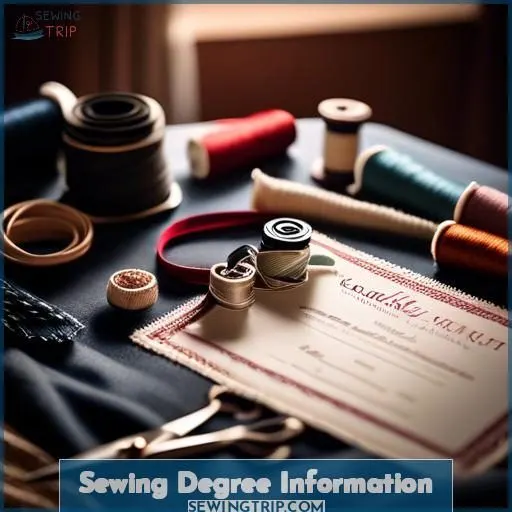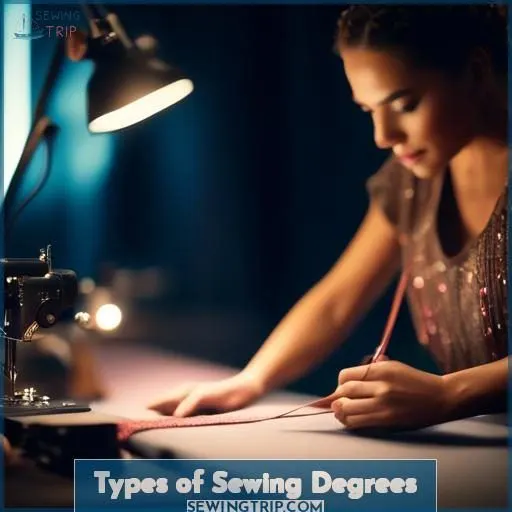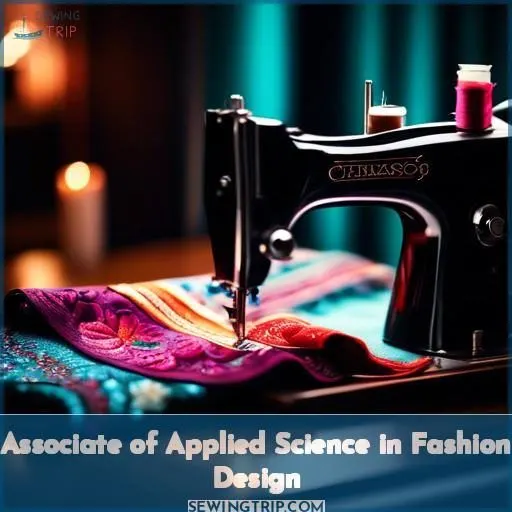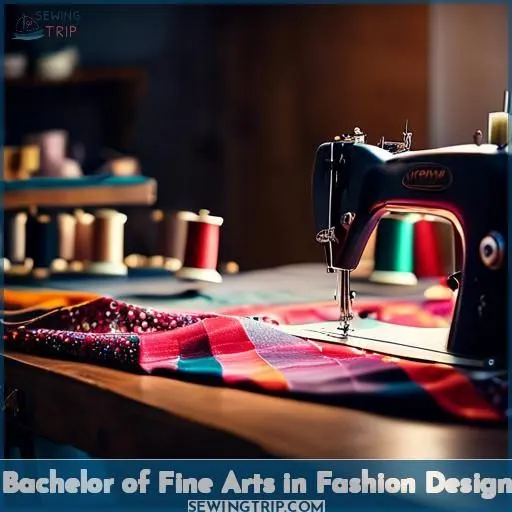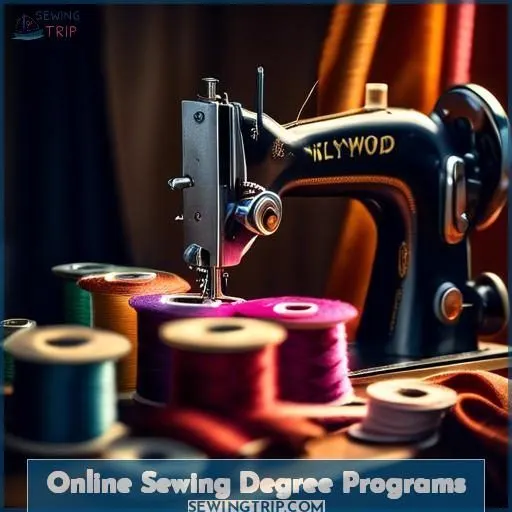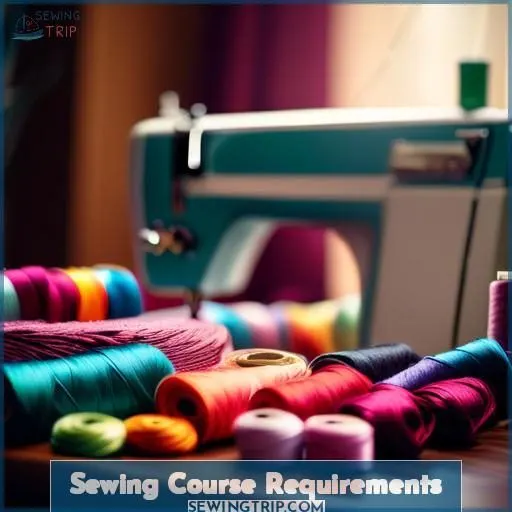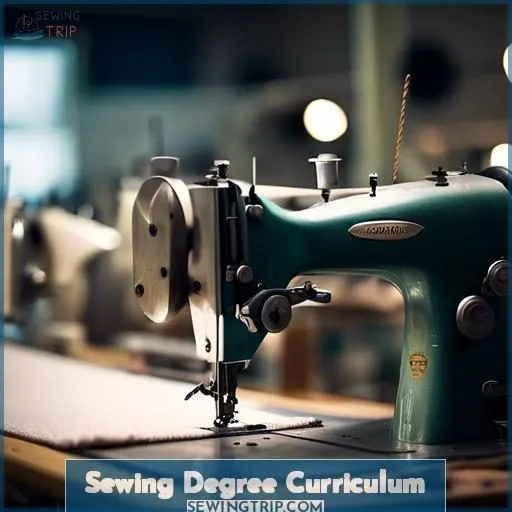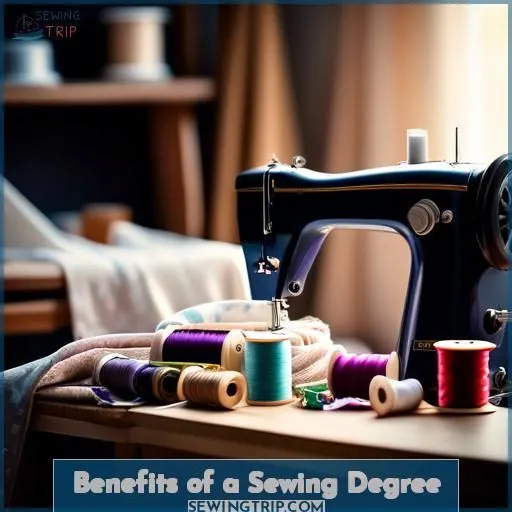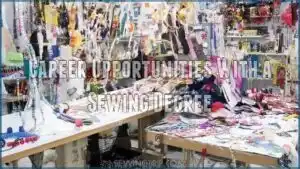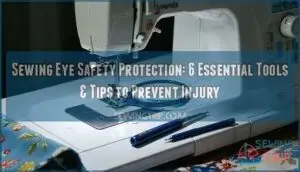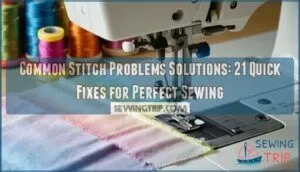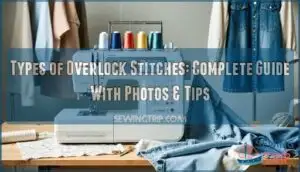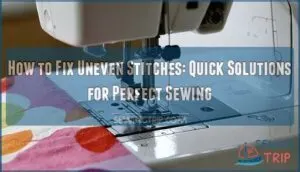This site is supported by our readers. We may earn a commission, at no cost to you, if you purchase through links.

Yes, you can get a degree in sewing. There are various degree options available, such as certificate programs, associate degrees, and bachelor’s degrees. These programs cover aspects like fabric science, patternmaking, garment construction, sewing machine operation, and design, art, and history. You can also find online classes and workshops.
With a sewing degree, you can enhance your skills, gain entrepreneurial confidence, and advance your technical knowledge. You can also explore career opportunities in the fashion industry, including roles like fashion designer, tailor, theater costume designer, clothing repair specialist, and pattern maker.
Table Of Contents
- Key Takeaways
- Can You Get a Degree in Sewing?
- Can You Get a Degree in Sewing?
- Sewing Degree Information
- Types of Sewing Degrees
- Associate of Applied Science in Fashion Design
- Bachelor of Fine Arts in Fashion Design
- Online Sewing Degree Programs
- Sewing Course Requirements
- Sewing Degree Curriculum
- Benefits of a Sewing Degree
- Career Opportunities With a Sewing Degree
- Frequently Asked Questions (FAQs)
- Conclusion
Key Takeaways
- There are various degree options available for those interested in sewing, including certificate programs, associate degrees, and bachelor’s degrees.
- Sewing degree programs cover aspects like fabric science, pattern making, garment construction, sewing machine operation, and design, art, and history.
- With a sewing degree, individuals can enhance their skills, gain entrepreneurial confidence, and pursue career opportunities in the fashion industry.
- Career opportunities in the fashion industry with a sewing degree include fashion designer, tailor, theater costume designer, clothing repair specialist, and pattern maker.
Can You Get a Degree in Sewing?
Yes, you can get a degree in sewing, with options ranging from apprenticeships and certificates to bachelor’s degrees in related fields like textiles and fashion design.
Can You Get a Degree in Sewing?
Yes, you can get a degree in sewing. There are various educational programs available that offer courses in sewing, including certificate programs, associate degrees, and bachelor’s degrees. These programs can help you acquire the skills and knowledge necessary to pursue careers in fashion, costume design, and industrial textile manufacturing.
Sewing degree programs typically include courses in fabric science, patternmaking, garment construction, and sewing machine operation. Depending on the program, you may also study design, art, and history to better understand the role of sewing in the fashion industry.
Associate of Applied Science and Bachelor of Fine Arts in Fashion Design programs often include sewing components, such as pattern drafting, design, and apparel construction. Online classes may require computers, internet, and sewing machines, and text-based instructions and video tutorials are provided for assistance and feedback.
To become a successful sewer, you should have a passion for sewing, manual dexterity, creativity, dedication, attention to detail, and customer service skills for business ventures. Career opportunities with a sewing degree include garment creation and alteration in the fashion industry, self-employment as a tailor or dressmaker, seamstress roles in theaters or film companies, clothing repair and maintenance, and pattern making and design.
Sewing Degree Information
Sewing degree programs provide a thorough education in various facets of the sewing field. These programs can be found in diverse departments, encompassing Family and Consumer Science, Art History, American Studies, and History. They frequently incorporate courses on sewing methods, pattern design, apparel construction, fabric selection, pattern grading, color theory, textile history, and pattern fitting and alteration.
Key aspects of sewing degree programs:
- Sewing Equipment: Students acquire proficiency in operating industrial sewing machines, stitching tools, and other essential sewing equipment.
- Fabric Selection: Courses guide students in selecting appropriate fabrics for various projects, considering factors such as texture, color, and durability.
- Pattern Grading: Students learn to modify patterns to suit different body shapes and sizes, ensuring an optimal fit for clients.
- Color Theory and Textile History: Programs may also offer courses on color theory and textile history, enabling students to comprehend the aesthetic and historical context of their creations.
These competencies are indispensable for a successful career in the sewing industry, whether it involves garment design, self-employment as a seamster or dressmaker, or employment in theaters or film companies.
Types of Sewing Degrees
If you’re interested in pursuing a career in sewing, you have several options for sewing education. You can choose from a variety of degrees, including an Associate of Applied Science and a Bachelor of Fine Arts in Fashion Design, which both include sewing components. Additionally, you can opt for online classes that require a computer, internet, and sewing machine, and offer text-based instructions and video tutorials. These programs can help you enhance your sewing skills, gain confidence for business startup, and provide technical knowledge and safety training.
When it comes to types of sewing degrees, there are several options available. You can pursue a four-year bachelor’s degree in a field like textiles, fashion design, art, or manufacturing at a specialty school or university. Alternatively, you can choose to enroll in online courses or workshops that teach various aspects of sewing, such as patternmaking, garment construction, and sewing machine operation.
Sewing education can lead to a variety of career opportunities. You can work in the fashion industry, creating garments and alterations, or start your own business as a tailor or dressmaker. Additionally, you can find roles in theaters or film companies as a seamstress, or offer clothing repair and maintenance services. If you’re interested in design, you can explore pattern making and design opportunities, which can be a long but rewarding learning path.
Associate of Applied Science in Fashion Design
Searching for a degree in sewing can open up a world of opportunity, allowing you to develop your skills, gain confidence, and pursue a career in the fashion industry. One of the options available is an Associate of Applied Science in Fashion Design, which provides a solid foundation in the field. Here are four reasons why this degree could be the perfect choice for you:
- Fashion history: Study the rich history of fashion and textiles, learning about the evolution of styles, trends, and techniques. This knowledge will give you a deeper understanding of the industry and help you make informed decisions in your future career.
- Job outlook: The fashion industry is always in need of skilled professionals. With an Associate of Applied Science in Fashion Design, you’ll be well-positioned to take advantage of job opportunities in various areas, such as garment creation, alteration, pattern making, and design.
- Skill development: This degree program will enhance your sewing skills, teaching you techniques in pattern drafting, design, and apparel construction. You’ll also gain a strong foundation in mathematics, style lines, and pattern grading, which are essential for a successful career in fashion.
- Career advancement: Upon completion of your degree, you’ll have the opportunity to further your education by pursuing a Bachelor of Fine Arts in Fashion Design or other advanced programs. This will allow you to specialize in a specific area of fashion and increase your earning potential.
Bachelor of Fine Arts in Fashion Design
If you’re enthusiastic about fashion and keen to enhance your abilities, a Bachelor of Fine Arts in Fashion Design is the ideal choice for you. This degree program provides a thorough education in fashion illustration, fashion sketching, draping, textiles, garment construction, custom design, fashion draping, pattern analysis, pattern blocks, and production patterns.
With a BFA in Fashion Design, you’ll acquire the technical knowledge and artistic skills necessary to materialize your designs. You’ll master sketching and illustrating your concepts, draping fabric to create an impeccable silhouette, and utilizing diverse textiles to craft captivating garments.
Furthermore, you’ll delve into pattern analysis and pattern blocks, essential for creating custom designs that fit impeccably. With an emphasis on production patterns, you’ll be well-equipped for a career in the fashion industry, where you’ll be capable of bringing your designs to fruition.
In essence, a Bachelor of Fine Arts in Fashion Design is the pinnacle degree for individuals aspiring to make an enduring contribution to the fashion landscape. So, if you’re prepared to unleash your artistic potential, it’s time to enroll in a BFA program and embark on your path to fashion excellence.
Online Sewing Degree Programs
In today’s digital era, sewing education has evolved to incorporate online learning platforms. These programs offer adaptability and comfort, enabling you to learn at your own rhythm and on your own timetable. Online sewing degree programs give access to a multitude of resources, including internships and apprenticeships, fashion design software, and textile innovations.
Online learning platforms provide an array of courses that cater to varying skill levels, from novice to advanced. These courses often incorporate video tutorials and text-based instructions, as well as online tutors for assistance and feedback. Some platforms even offer complimentary trials, allowing you to test the platform before committing to a subscription.
Internships and apprenticeships are also available through online sewing degree programs, providing practical experience and real-world applications of your skills. These opportunities can aid you in building a professional network and gaining valuable industry insights.
Fashion design software is another indispensable tool for sewing professionals. Online sewing degree programs often integrate these tools into their curriculum, instructing you on how to utilize them to create professional-grade clothing designs. From pattern drafting to 3D modeling, these software programs can help you streamline your design process and produce high-quality garments.
Textile innovations are at the vanguard of the sewing industry, and online sewing degree programs keep pace with these trends. By incorporating the latest technology and materials into their curriculum, these programs guarantee that you’re well-equipped to tackle any project that comes your way.
Sewing Course Requirements
Ready to thread the needle of your future career? Diving into a sewing degree means you’ll stitch together a robust skill set. You’ll need a beginner’s enthusiasm paired with a commitment to mastering sewing machine knowledge and pattern making techniques.
Imagine transforming a plain piece of fabric into a fashion masterpiece—that’s your journey ahead. You’ll measure twice and cut once, learning the precision of garment construction and the intricacies of textile science.
Forget about fumbling with commercial patterns; you’ll be padding a form and draping like a pro with the fair fit method. It’s not just about threading a needle; it’s about weaving your path in the tapestry of the fashion world.
Sewing Degree Curriculum
Sewing degree curriculum is designed to provide students with a thorough understanding of the art and science of sewing. The curriculum typically includes courses on sewing history, sewing tools, sewing techniques, fabric knowledge, industry trends, and sewing degree curriculum. Students will learn about the basics of sewing, including how to use sewing machines, threading techniques, and basic stitches. They’ll also study advanced sewing techniques, such as pattern drafting, design, and apparel construction.
Sewing degree programs may also offer courses on fashion history, allowing students to explore the progression of fashion and its impact on society. Additionally, students may have the opportunity to participate in internships or on-the-job training, gaining practical experience in the field.
The curriculum is designed to prepare students for a variety of career options in the sewing industry, including garment creation and alteration in the fashion industry, self-employment as a tailor or dressmaker, seamstress roles in theaters or film companies, clothing repair and maintenance, and pattern making and design. By the end of the program, students will have the skills and knowledge needed to pursue a successful career in sewing.
Benefits of a Sewing Degree
Pursuing a degree in sewing can greatly enhance your skills and bolster your confidence to embark on your own entrepreneurial venture. It also imparts advanced technical knowledge, equipping you for a diverse array of professional opportunities within the fashion industry.
Skill Enhancement Opportunities
Ignite your sewing abilities with a degree that empowers you with opportunities to refine your skills. Participate in workshops to acquire innovative techniques, obtain certifications to enhance your credentials, and become proficient in sewing machine maintenance.
Remain abreast of industry advancements and business management principles. With a sewing degree, you’ll transform into a creative force, poised to drive innovation and thrive in the sewing realm.
Entrepreneurial Confidence Boost
Embark on the fashion industry with a sewing degree that equips you with the skills for independent employment. It’s not merely about joining fabrics; it’s about incorporating your distinctive viewpoint into the fabric of a small business.
With enhanced self-belief, you’ll shape your earning potential, overseeing artistic endeavors and entrepreneurial obligations.
Arouse your inner fashion icon and stitch your path to prosperity!
Technical Knowledge Advancement
Imagine becoming an expert in sewing with a degree that gives you the technical know-how. Your path will involve learning about the tools you need, software programs, and industry licenses.
As you progress, you’ll discover advanced pattern making, fabric science, and even the details of fit, backing, binding, scraps, and muslin.
This thorough education will give you the skills to handle any sewing challenge with assurance.
Career Opportunities With a Sewing Degree
With a degree in sewing, you’re stitching your way to a tapestry of career opportunities in the fashion industry. Imagine transforming fabric into high fashion, or tailoring the perfect fit—your skills could take you there. Self-employment beckons with the promise of being your own boss, while theater roles await those who dream of dressing the stars. Clothing maintenance safeguards longevity in a throwaway world, and pattern design merges creativity with precision.
| Career Path | Why It’s Sew Cool |
|---|---|
| Fashion Designer | Weave your own brand, be the next trendsetter. |
| Tailor/Self-Employed | Stitch your schedule, hem your income potential. |
| Theater Costume Designer | Dress characters, bring stories to life. |
| Clothing Repair Specialist | Save garments, save the planet. |
| Pattern Maker | Draft the future of fashion, one line at a time. |
College prep in sewing can be your ticket to a fulfilling career, and while paying for college is no small feat, the responsibilities in the sewing industry come with a spool of income potential. So, can you get a degree in sewing? Absolutely, and it’s a cut above the rest!
Frequently Asked Questions (FAQs)
How does sewing experience impact fashion innovation?
Sewing experience stitches together creativity and technical skill, pushing the boundaries of fashion innovation. It’s the secret sauce that transforms a good idea into a wearable masterpiece, making you a trendsetter, not a follower.
Can sewing skills enhance personal wardrobe sustainability?
Sewing skills can enhance your personal wardrobe sustainability in several ways. By sewing your own clothes, you can reduce your consumption of ready-to-wear garments, which often have a negative environmental impact due to their production and disposal. Sewing also allows you to tailor clothes to your specific needs and preferences, ensuring that you have items that truly fit and suit your lifestyle, which can lead to less clothing waste overall.
Additionally, sewing skills can help you repair and alter existing clothes, extending their life and reducing the need for new purchases. Overall, sewing can be a powerful tool for creating a more sustainable wardrobe and reducing your environmental footprint.
What are the challenges of transitioning from hobbyist to professional sewer?
Embarking on a Professional Sewing Career
Shifting from a recreational hobbyist to a skilled professional sewer can present obstacles, yet with unwavering commitment and a strategic approach, it can be accomplished. Here are crucial aspects to ponder:
-
Skills and Education: Elevate your sewing prowess through training courses, workshops, or online platforms. Degree programs in fashion design and apparel construction can equip you with a solid foundation in sewing techniques and design principles.
-
Time Management: Balancing a full-time occupation with sewing can be taxing. Prioritize your schedule and allocate dedicated sewing sessions. For instance, reserving weekends or evenings for sewing can aid in harmonizing your career and passion.
-
Adaptability: Be prepared to modify your schedule and priorities. Adjust your sewing time to accommodate your employment or other obligations.
-
Networking: Establish connections with fellow sewers and industry professionals. This can provide insights into job opportunities and valuable knowledge about the sewing world.
-
Patience and Persistence: Forging a career in sewing requires time and effort. Exercise patience and persistence, and embrace freelance projects or entrepreneurial ventures to gain experience and build your portfolio.
-
Financial Considerations: Comprehend the financial implications of sewing as a business. Investigate pricing strategies and prepare to invest in equipment and materials.
-
Self-Promotion: Showcase your work and services to prospective clients. This can help establish a client base and build your reputation within the industry.
How do sewing professionals stay updated with industry trends?
To stay updated with industry trends, sewing professionals can:
Attend workshops or seminars to explore new sewing techniques.
Collaborate with influencers in the sewing or fashion niche.
Participate in targeted advertising campaigns on social media platforms to reach their ideal customers.
Stay informed about:
Sustainable practices
Online retail and e-commerce platforms
Changes in fashion preferences
Adapting to the dynamic industry can help sewing professionals stay competitive.
What role does technology play in modern sewing practices?
Oh, technology in sewing? It’s like giving a caveman a smartphone. Suddenly, your grandma’s sewing machine looks like a relic as AI and digital feeds turn fabric into fashion at warp speed. Welcome to the future!
Conclusion
Ever envisioned transforming your sewing passion into a profession? The realm of sewing education is your portal to a creative and fulfilling future. From certification courses to undergraduate degrees, a sewing degree awaits every skill level.
With a sewing degree, you’ll refine your abilities, cultivate entrepreneurial assurance, and expand your technical expertise. Discover career paths in the fashion realm and unlock your creative potential.
So, is a sewing degree obtainable? Indubitably!

